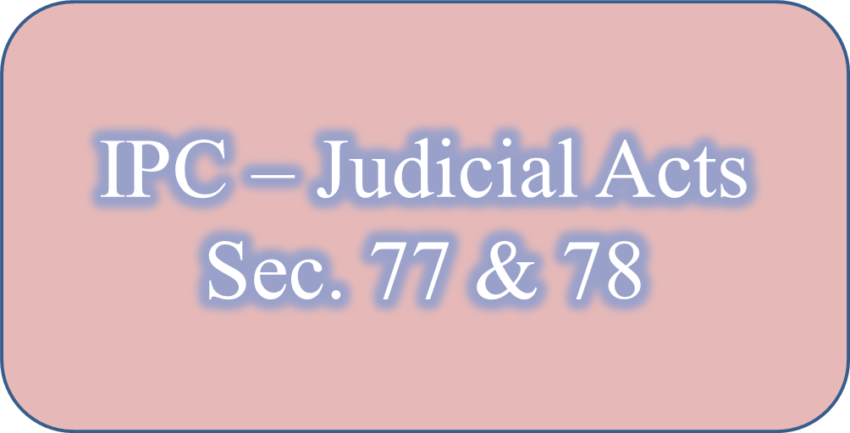IPC – Judicial Acts
IPC Judicial Acts ( Sec. 77-78)
Chapter IV of Indian Penal Code, 1860 provides following acts which are exempted under the code from criminal liability
General Exceptions ( Sec. 77 – 78) relates acts of Judges and Courts (Judicial Acts)
Sec. – 77. “Act of Judge when acting judicially.”
- Whenever any act is done by a judge judicially in exercise of the power given him by law then the act is no offence.
- Whenever any act is done by a judge judicially in good faith believing that he is empowered by law then the act is no offence.
If above conditions are fulfilled in doing any act then the act is exempted under the code from criminal liability where the accused is not charged of the crime committed. As the acts show absence of mens rea i.e. guilty mind. While Actus rea and mens rea are two essential elements to impose criminal liability on accused.
According to Principle of criminal liability in IPC which is basis on latin maxim “Actus non faciet reum nisi mens sit rea”
For an example – A judge who sentences a prisoner to death (even wrongly) is not responsible for his death by hanging.The act of judge is exempted under the code from criminal liability where the judge is not charged of the crime committed. As the acts show absence of mens rea i.e. guilty mind.
A K Chaudhary v. State of Gujrat, 2006 CrLJ 726 ( Guj)
‘According to the section a Judge is exempted not only in those cases in which he proceeds irregularly in the exercise of a power which the law gives him, but also in cases where he exceeds his jurisdiction in good faith and has no lawful powers. It protects judges from criminal process as the Judicial Officers Protection Act, 1850, saves them from civil suits.
Judicial officers Protection Act provides protection of two broad categories of acts done or ordered by a judicial officer in his judicial capacity.
In the first category falls the acts which are within the limits of his jurisdiction. The second category encompasses the acts which are not within the jurisdiction of the judicial officer, but are done or ordered by him, believing in good faith that he had jurisdiction to do or order them.’(1)
Surendra Kumar Bhatia v. Kanhaiya Lal, (2009) 12 SCC 184: AIR 2009 SC 1961
A Collector who exercises powers of enquiry and award under the Land Acquisition Act, 1894 is not acting judicially because he is not a judge. He is not entitled to the protection of section 77.
ES Sanjeeva Rao v. CBI, Mumbai, 2012 CrLJ 4053 (Bom).
Regional Provident Fund Commissioner while passing order under section 7-A of 1952 Act is entitled to get protection as envisaged under section 77 of IPC, 1860 and section 3(1) of Judges (Protection) Act, 1985.
Sec. – 78. “Act done pursuant to the judgment or order of Court.”
- Whenever any act is done in pursuance of any judgement or order (remains in force) of a court of justice in good faith believing that the court had such jurisdiction, while the court had no jurisdiction to pass such judgement or order then the act is no offence.
If it were be an offence the hangman who hangs the prisoner in pursuance of the order of the judge, would also be responsible.
If above conditions are fulfilled in doing any act then the act is exempted under the code from criminal liability where the accused is not charged of the crime committed. As the acts show absence of mens rea i.e. guilty mind. While Actus rea and mens rea are two essential elements to impose criminal liability on accused.
According to Principle of criminal liability in IPC which is basis on latin maxim “Actus non faciet reum nisi mens sit rea”
This section is merely a effect of Section 77. It provides protection to officers acting under the authority of a judgement, or order of a Court of Justice.
It differs from section 77 on the question of Jurisdiction. Here, the officer is protected in carrying out an order of a court which may have no jurisdiction at all, if he believed that the court had jurisdiction; whereas under section 77 the judge must be acting within his jurisdiction to be protected by it.
Mistake of law can be pleaded as a defence under section 78.

